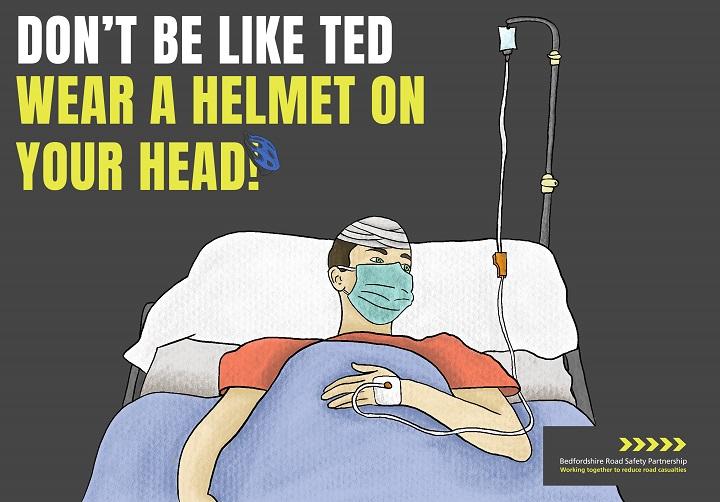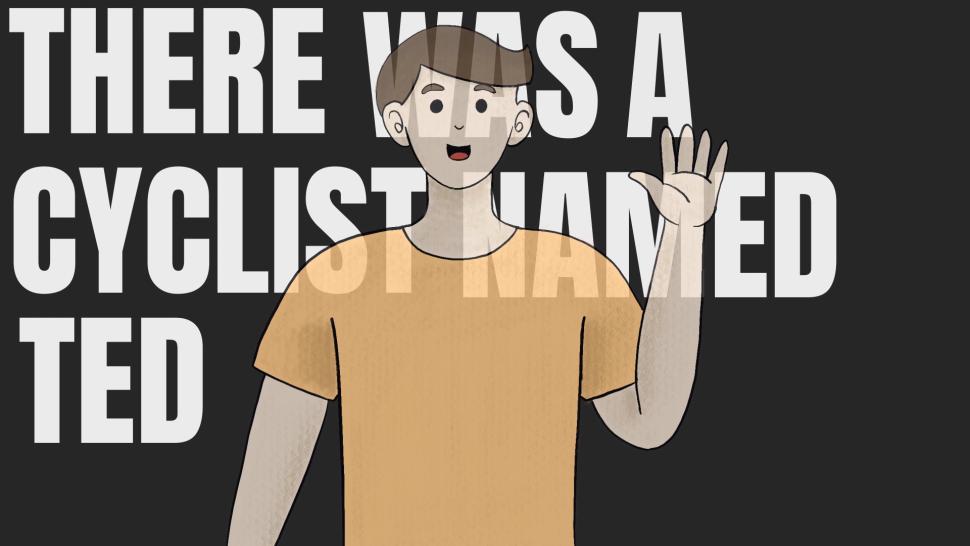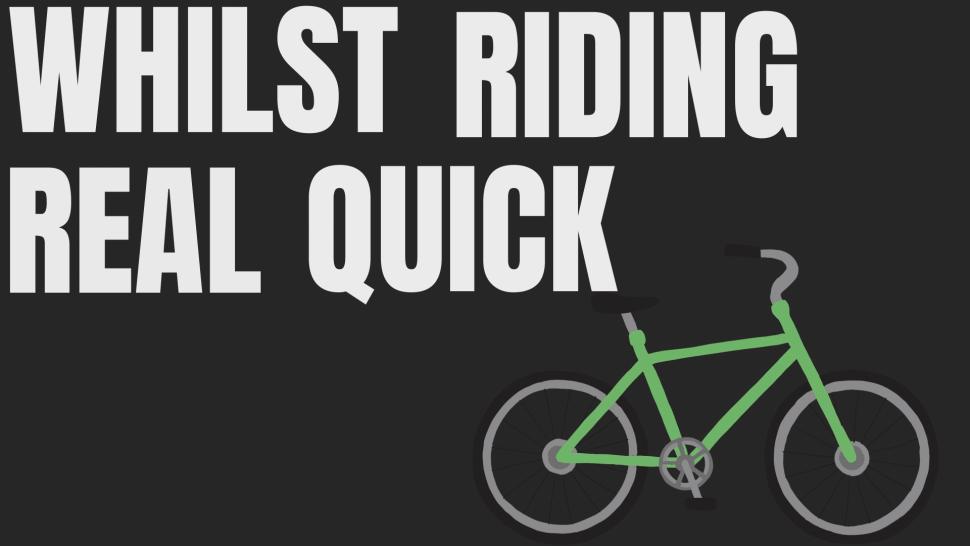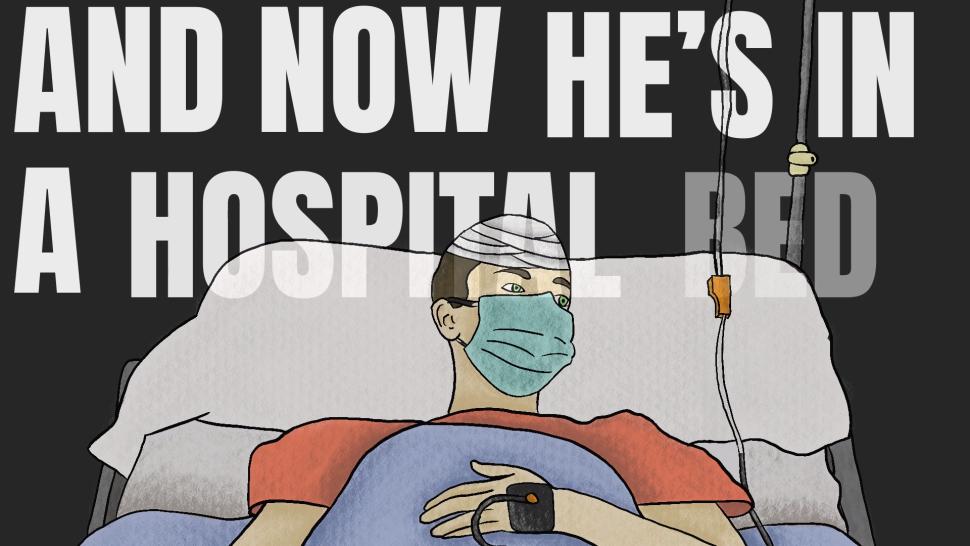- News
- Reviews
- Bikes
- Components
- Bar tape & grips
- Bottom brackets
- Brake & gear cables
- Brake & STI levers
- Brake pads & spares
- Brakes
- Cassettes & freewheels
- Chains
- Chainsets & chainrings
- Derailleurs - front
- Derailleurs - rear
- Forks
- Gear levers & shifters
- Groupsets
- Handlebars & extensions
- Headsets
- Hubs
- Inner tubes
- Pedals
- Quick releases & skewers
- Saddles
- Seatposts
- Stems
- Wheels
- Tyres
- Tubeless valves
- Accessories
- Accessories - misc
- Computer mounts
- Bags
- Bar ends
- Bike bags & cases
- Bottle cages
- Bottles
- Cameras
- Car racks
- Child seats
- Computers
- Glasses
- GPS units
- Helmets
- Lights - front
- Lights - rear
- Lights - sets
- Locks
- Mirrors
- Mudguards
- Racks
- Pumps & CO2 inflators
- Puncture kits
- Reflectives
- Smart watches
- Stands and racks
- Trailers
- Clothing
- Health, fitness and nutrition
- Tools and workshop
- Miscellaneous
- Buyers Guides
- Features
- Forum
- Recommends
- Podcast
news
 Helmet campaign (Bedfordshire Road Safety Partnership)
Helmet campaign (Bedfordshire Road Safety Partnership)Road safety organisation accused of "victim-blaming" over cycling helmet campaign
A road safety organisation has come under fire for its latest campaign, which urges cyclists to wear a helmet and has been criticised for "victim-blaming" and failing to tackle road danger "at source".
Bedfordshire Road Safety Partnership — a group "working together to reduce road casualties" and is made up of representatives from the council, police, fire and rescue and the Bedfordshire Police and Crime Commissioner — launched the campaign, which has since been shared on Road Safety GB's website, a national road safety organisation.
In the video, which can be viewed on the Bedfordshire group's website, viewers are shown an animated story of a cyclist called Ted, who didn't wear a helmet on his head. "Whilst riding real quick, he hit a big stick, and now he's in a hospital bed," the rhyme ends.
The campaign was also shared on Road Safety GB's website, the national road safety organisation that is run in association with THINK! and representatives from groups across the UK, including local government road safety teams.
Road Safety GB said the campaign aims to make wearing a helmet "the norm", drawing on comparison with Australia where helmet use is mandatory and cyclists breaking the rules can be fined.
It was also revealed that all schools in Bedfordshire have been sent the resources to add to their social media accounts and pass on to parents in newsletters.
Promoting the three-week campaign, a spokesperson told Road Safety GB: "We are trying to make wearing a helmet the norm, as it is in Australia. To do so, we are targeting all age groups to change their habits – as has happened with the wearing of seatbelts over the years."
The campaign was shared on social media by one Twitter (X) user simply saying, "Oh dear", while another joked about the comparison to Australia a country "famous for so much cycling".
> Why is Dan Walker's claim that a bike helmet saved his life so controversial?
Another reply shared a link to an Australian Institute of Health and Welfare report which showed one in five people injured on Australian roads and paths is a cyclist while the rate of hospitalisation for cyclists increased by 1.5 per cent per year over the 17-year period of the report, 4.4 per cent year-on-year in the final six years of the report.
"If this approach works why do the stats show cycling is getting more dangerous in Australia? Stop victim-blaming and tackle road danger at source," they said. "If you really want to make the roads safer for people on bikes campaign for proper infrastructure. Helmets and personal protective equipment are not and never will be the answer."
The reply also tagged England's cycling and walking commissioner Chris Boardman, who famously said back in 2014 that helmets are "not even in top 10 of things that keep cycling safe".
In June, an Irish children's hospital consultant spoke out making the case for cyclists to be legally required to wear a helmet, arguing accident and emergency units see a spike in crash-related injuries during the summer months.
The UK government has repeatedly shut down occasional calls for cyclists to be required to wear a helmet, most recently in December of last year when a minister of state from the Department of Transport said the matter had been considered "at length" during the cycling and walking safety review in 2018.
They said: "The safety benefits of mandating cycle helmets for cyclists are likely to be outweighed by the fact that this would put some people off cycling, thereby reducing the wider health and environmental benefits. The Department recommends that cyclists should wear helmets, as set out in the Highway Code, but has no intention to make this a legal requirement."
Dan is the road.cc news editor and joined in 2020 having previously written about nearly every other sport under the sun for the Express, and the weird and wonderful world of non-league football for The Non-League Paper. Dan has been at road.cc for four years and mainly writes news and tech articles as well as the occasional feature. He has hopefully kept you entertained on the live blog too.
Never fast enough to take things on the bike too seriously, when he's not working you'll find him exploring the south of England by two wheels at a leisurely weekend pace, or enjoying his favourite Scottish roads when visiting family. Sometimes he'll even load up the bags and ride up the whole way, he's a bit strange like that.
Latest Comments
- quiff 26 min 54 sec ago
Less academic, but memorably encapsulated recently by Saoirse Ronan
- quiff 38 min 20 sec ago
Fascinating - I have always thought Hersheys has a whiff of vomit about it!
- Global Nomad 39 min 19 sec ago
good to see you're testing the farsports wheels - hope to see road.cc continue to expand the range of brands it considers. These or the shallower...
- chrisonabike 41 min 51 sec ago
Duly triggered! (At least "it's comedy!" though)....
- quiff 43 min 17 sec ago
Agreed, though those in thrall to the car lease would probably think the same of my coffee expenditure...
- chrisonabike 44 min 59 sec ago
Frustratingly we could probably avoid (most of) this if only one or two fundamental things were the other way around e.g. "you can only drive on...
- chrisotherwise 1 hour 12 min ago
Sadly very normal. And the sand contains loads of evil little shards of flint.
- David9694 4 hours 21 min ago
Random driver account: "cyclists should be made to wear hi viz like workers do on a building site"....
- quiff 4 hours 34 min ago
"The algorithm" served me an older JV video last week which I now can't get out of my head....




Add new comment
77 comments
At this point road.cc is straying into becoming a clickbait publisher on this topic. Hint that isn't a good thing.
Whilst it might get more eyeballs and uninformed comments, these kinds of articles are typically Black or White logical fallacies. If the author doesn't understand this, then they really should be looking for another job.
I tend to agree that after being here a while you start wishing the world would lay off the helmet. And to paraphrase Chris Boardman it's a sideshow in terms of cycle safety and even "public image".
Unfortunately that is one of the topics that both those who wish to "make it better" AND those who would rather cyclists just disappeared reach for first and often. I'm not sure I want to see road.cc solely reporting on drivetrain compatibility and the details of bike races.
It's also rather easy to fall into a trap while pointing it out...
Cycle helmet wearing arguments in the UK often ignore the disgusting toxicity of the UK driver insurance industry.
If a driver crushes your body, not wearing a bit of polystyrene on your head, designed for cycle racing impacts, will find you with contributory negligence. Your claim against a dangerous driver will be vastly reduced or kicked out.
So tell me, on balance, what are cycle helmet campaigns about?
Road CC server repeat. Again.
If the claim is for injuries other than head then the lack of a helmet is neither here nor there. The claimant will receive full compensation.
As for head injuries then it becomes a bit greyer. If you have a low speed impact as in <12mph for which helmets are designed for then contributory kicks in and will be based on type of head injury. If there is a collision at say 30mph plus with a vehicle the claim should be full and a decent legal team should be able to argue the case that said piece of protection would not have prevented or mitigated a head injury.
Helmets are designed to protect fully the head at low speed, oblique impacts and not the forces placed by 2 tonne vehicles being driven at speeds greater than 30mph. Your 'racing' helmet is designed to the same spec as standard helmets and even the manufacturers state that the helmets aren't up to the job in their small print.
The whole contributory negligence claim by insurers is a bit of a scam to get out of paying full compensation. And is using fear to force people to taking measures that won't necessarily help in high speed impacts
I would much rather various authorities put greater effort into reminding motorists of their responsibilities when driving and for them to actually look where they're going.
Here's a link from a Scottish law firm discussing the issue.
https://morayclaims.co.uk/if-you-were-not-wearing-a-cycle-helmet-can-you...
I've tried to send them this email, however it bounced back. Clearly a professional organisation 🤦♂️
Hi,
I've been made aware of your recent campaign on cycle helmets. I see your website also uses CyclingUK videos to help educate cyclists on how to stay safe on the road. I'm a member of CyclingUK myself. I would like to point out CyclingUK's well thought out page on cycle helmets, which can be found here.
I'm of the strong belief that while cycle helmets can make a rider safer in certain circumstances (rarely collisions involving drivers), there are a multitude of measures and campaigns that can be undertaken rather than encouraging helmet use that are more effective. I have a few questions regarding your cycling campaigning activities:
Before starting this recent campaign, did you consider asking CyclingUK, the UK's leading charity on safety for cyclists, what the best campaign to run to improve cyclist safety would be?
Have you ever considered running a Dutch reach campaign for when people open their driver side door?
Have you ever campaigned for any carriageway improvements such as 20mph zones, or segregated cycle lanes?
It won't surprise you to learn I do think this cycle helmet campaign is ill-advised, and I'll be interested to hear your responses to my questions. How you answer them will help me decide whether I think you as an organisation genuinely care about the safety of my friends, family and myself while riding bikes, or whether you just see it as a box ticking exercise.
Thanks for your time,
Tom
We haven't had a proper helmet debate for ages.
Debate?!
I think most of the comments have been quite reasonable apart from the odd poster who has to make inane insulting comments about other peoples IQ
Oh, you're back again? Been on holiday?
It's been at least a fortnight.
Can someone please point me in the direction of Bedfordshire/GB Road Safety's three week campaigns aimed at drivers on:
- overtaking cyclists respecting safety distances
- not overtaking cyclists when there isn't the space (oncoming traffic, blind bends, traffic islands...) or time (crossroads/traffic lights... coming up)
- driving within the speed limits or slower when around cyclists
- not making left turns immediately after overtaking a cyclist
- not tailgating, honking at, yelling at cyclists you cannot safely overtake
- not driving into advanced stop boxes or into crossing cycle lanes
- and generally not making lots of unnecessary car journeys?
Wearing helmets is cultural. In countries where it is normal to cycle the people do not where helmets. However in these countries cycling is not dangerous as everyone (including car drivers) are cyclists. I would not consider the UK a safe country to cycle and until more people cycle I'm wearing a helmet.
Good points but as a resident of rural Netherlands for many many years now i can promise you that far from all drivers and probably not even most drivers are cyclists. That idea is a myth.
One problem with your position is that the helmet does not protect you from the things most likely to cause harm - large, heavy, fast-moving vehicles.
Cycle helmets are designed to prevent/reduce injury if you fall from your bike at low speed and hit your head on a hard surface. That's not anything like the same being hit by 2 tonnes of metal that's moving at 30 mph.
It's a bit like wearing a lightweight stab vest when someone shoots you with an AR-15 assault rifle.
If 90% of pedestrians wore helmets do you think that the number of peds being hit and killed or injured by drivers would change? It wouldn't. Helmets do not prevent collisions so they won't solve the real problem for everyone - driver behaviour.
Perhaps Bedfordshire Road Safety Partnership might like to read this about helmets.
https://www.rwcpulse.com/blogs/peeking-at-plans/bike-helmets-01-7533472
Interesting read doesn't entirely agree with the BMJ.
https://bmjopen.bmj.com/content/9/9/e027845
Mind you give me enough time and I can find you one lot or another that will produce findings that argue the exact opposite using the same basic data.
That's basically a large hospital study and therefore suffers from the same methodological short-comings.
I recently had a car pull out in front of me whilst I was cycling at about 19mph I managed to get the bike slowed down but not me so the bike was pretty much Ok. I smashed my head twice once into the car that had stopped right across the road and then on the tarmac when I was unconscious. I have a very badly bruised shoulder, a broken rib, a black eye, a broken tooth, and a sore neck. I also lost about 8 hours which I remember nothing about including the incident, the ambulance, the scans, and the first few hours in hospital. My helmet had broken the eps in two places at the front from the initial impact and the second impact on the road had broken the back in three places. The CCTV was the only way I could tell you what happened. Without the helmet I would most likely be dead. They are not known as purposes they are accidents. Nobody wants to have them. Doesn't matter who is at fault. If you come off at any speed and hit your head a helmet might just mean you stay alive. Incidentally the Police will be prosecuting the driver who failed to give way.
The issue with this argument is, you could remove a number of things to prevent injury, such as not going out, an increased headwind on the day, slower riding, or the most obvious, if the car driver was trained better, more attentive and hadn't pulled out, you wouldn't have required a helmet in the first place. Yes it's great as a motivation tool but the next rider they take out might not be so lucky
Don't be dim. Sooner or later you will have a collision with something it may be your fault, someone else's, it doesn't matter when it happens and you are dead your wife mother father other will think you a selfish twit for not bothering to make a chin strap go click. By and large cycling is not dangerous nor are 99.9% of the other road users. But 0.1% are and everybody but everybody makes a mistake from time to time. People will never be 100% perfect. Most mistakes cause no harm or damage to anybody every now and then one will. I guarantee you are no more perfect than anyone else. Tell me you have never thought I shouldn't have done that about something and I will call you a fool to your face because you are living in cloud cuckoo land if you believe you have always done everything perfectly. You don't think I know that one second would have made a difference but consider this that one second didn't happen. As for the next rider they take out well let me put it another way if another rider without a helmet had been in my place they would not be telling you to wear a helmet, they would be pushing up the daisies.
It's amazing how the effectiveness of helmets is so exagerated in the minds on the faithful. The number of people whose lives have been saved by helmets according to annecdote far exceeds the number of cyclists who were dying to head injuries before helmets.
So either most people "who would have died" without a helmet would not actually have died.
OR
Drivers are now knocking cyclists down far more frequently safe in the knowledge that their helmets protect them.
Do you wear a helmet when out walking? why not? head injuries per billion km are higher for pedestrians than for cyclists.
Nope don't wear a helmet when walking I do wear a coat and hat if it looks like rain though. Only hit my head once while walking when I was a boy I walked into a lamppost while chatting to my father.
Well as well as the consultant the copper also thought it saved my life so you who know very little about this are heavily outweighed by those that have seen the accident and what was left of the helmet.
Don't bother arguing with the usual helmet muppets on here - it's not worth your time.
I completely agree that wearing helmets, in general, is a good thing, and those here who are involved in the inexplicable campaign against wearing them, and bullying/intimidating/shaming those who do wear helmets should be ashamed of themselves for promoting a pathetic agenda of falsehoods and intimidation.
Unfortunately their IQ doesn't yet meet their age.
Don't bother arguing with the usual helmet muppets on here - it's not worth your time.
I completely agree that wearing helmets, in general, is trivial, and those here who are involved in the inexplicable campaign for wearing them, and bullying/intimidating/shaming those who do not wear helmets should be ashamed of themselves for promoting a pathetic agenda of falsehoods and intimidation.
You're missing the point, statistics show that walking is at least as dangerous as cycling for head injuries, you admit in a previous post that you are not 100% perfect. Sooner or later you will have a collision with something it may be your fault, someone else's, it doesn't matter when it happens and you are dead your wife mother father other will think you a selfish twit for not bothering to make a chin strap go click.
"People will never be 100% perfect."
Then all driving of 2 tonne high speed vehicles must cease.
For goodness sake. The fact is, they did go out, the car driver pulled out, they were riding at that speed whatever reason, and in their opinion the helmet helped to reduce the level of injury and possibly even prevent death. Yes, it is probably subjective. But wearing a helmet is common sense. It certainly isn't going to do you any harm. I am fed up with cyclists bleating about how they shouldn't have to wear one and how they may not protect you as much as you think. No, you shouldn't have to. Yes, the real world should be more considerate when it comes to cyclists. But it often isn't and accidents happen so just wear the damn thing.
Someone else missing the point.
We don't have an issue with wearing a helmet, but we do have an issue with people that think they are the only conversation to be had over road safety. It's obviously great for people that don't like cyclists as they can just blame anyone that chooses to not wear a helmet and call them an idiot (it's common sense after all).
There are downsides to wearing a helmet and places that mandated helmet wearing saw a reduction in the number of cyclists - a so-called safety measure that instead increases the chance of heart disease etc. through inactivity. It's far better that we just get people on bikes and shut the hell up about helmets.
"Accidents happen" - that's the siren song of incompetent drivers that don't believe that drivers have any agency in crashes. Not paying attention and not driving to the conditions is by far the biggest cause of crashes, but hey, accidents happen yeah?
It's insidious when we get cyclists simping to the helmet manufacturers and singing their praises, when they are way down the list of safety measures we need to be talking about. We'll never get to Vision Zero by just putting a helmet on everyone, but that's all that "safety" organisations seem to be willing to talk about. Banging on about helmets and ridiculing the adults that actually want a more intelligent conversation about road safety is counter-productive and makes you look like an idiot, just repeating the same old cliches.
https://road.cc/content/news/111258-chris-boardman-helmets-not-even-top-10-things-keep-cycling-safe
I don't think I am missing 'the point' at all. The point of this campaign is to get more cyclists to wear helmets to protect themselves against injury or death. No, it doesn't address all the other causes of accidents/collisions. So what? Campaigns to get people to wear seatbelts or to not drive while using a mobile phone didn't/don't either. They encourage or discourage certain behaviours with the aim of making incremental improvements in safety. Perhaps the simplest thing to do would actually be to make helmets mandatory. It robs anti-cyclists of an argument against us and we can fund a campaign to encourage more cycling to compensate for the supposed decline in participation and combat inactivity instead.
Pages